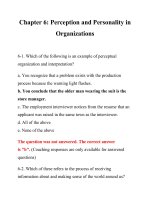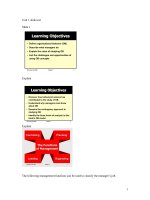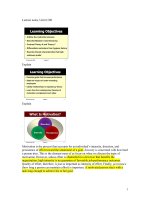Organizational behavior: Lecture 6 - Dr. Mukhtar Ahmed
Bạn đang xem bản rút gọn của tài liệu. Xem và tải ngay bản đầy đủ của tài liệu tại đây (606.15 KB, 40 trang )
Organizational
Behavior
(MGT-502)
Lecture-6
Summary
of
Lecture-5
Challenges to Organizations
Globalization
Diversity
Technology
Ethics
Ability
Mental and physical
capabilities to perform
various tasks.
Learning
A relatively permanent
change in the behavior
occurring as a result of
experience.
Learning Theories
Social
Learning
Classical
Conditioning
Prentice Hall, 2001
Chapter 2
Operant
Conditioning
6
Today’s Topics
Values
The Person
• Skills & abilities
• Personality
• Perceptions
• Attitudes
•Values
• Ethics
The Environment
• Organization
• Work group
• Job
• Personal life
Behavior
B = f(P,E)
Values.
– Values are broad preferences
concerning appropriate courses of
action or outcomes.
– Values influence behavior and attitudes.
The Importance of Values
Behavior
Motivation
Perceptions
Attitudes
Values
Values
basic convictions that “a specific mode of
conduct or end-state of existence is personally
or socially preferable to an opposite or
converse mode of conduct or end-state of
existence.”
– They contain a judgmental element in that they
carry the individual’s idea of what is right, good, or
desirable.
– Value System -- a hierarchy based on a ranking of
an individual’s values in terms of their intensity.
Importance of Values
– Values generally influence attitudes and
behavior.
Sources of our Value Systems
– A significant portion is genetically
determined.
– Other factors include national culture,
parental dictates, teachers, friends, and
similar environmental influences.
– Values are relatively stable and enduring.
The Importance of Values
Judgment
Content
Stability
Intensity
Ethical Behavior
Ethical Behavior - acting in ways
consistent with one’s personal
values and the commonly held
values of the organization and
society.
Values, Ethics & Ethical Behavior
Value Systems - systems of beliefs that
affect what the individual defines as right,
good, and fair
Ethics - reflects the way values are acted out
Ethical behavior - actions consistent with
one’s values
Cognitive Moral Development
Cognitive Moral Development - The
process of moving through stages of
maturity in terms of making ethical
decisions
Level l
Premoral
Level ll
Conventional
Level lll
Principled
Values, Loyalty, and Ethical
Behavior
Ethical Values and
Behaviors of Leaders
Ethical
Ethical Climate
Climate in
in
the
the Organization
Organization
Sources of values.
– Parents.
– Friends.
– Teachers.
– Role models.
– External reference groups.
Types of values.
–Terminal values.
Preferences concerning the ends
to be achieved.
–Instrumental values.
Preferences for the means to be
used in achieving desired ends.
Types of values — cont.
Theoretical values.
Economic values.
Aesthetic values.
Social values.
Political values.
Religious values.
Patterns and trends in values.
Duty.
Honesty.
Responsibility.
Economic incentives.
Organizational loyalty.
Work-related identity.
Individual Differences Impact Job
Performance & Job Satisfaction
Values
Attitudes
Abilities
Job
Performance
Job
Satisfaction
Work Values
Achievement (career advancement)
Concern for others (compassionate
behavior)
Honesty (provision of accurate
information)
Fairness (impartiality)
Individual/Organizational
Model of Ethical Behavior
Individual Influences
Value systems
Locus of control
Cognitive moral development
Organizational Influences
Codes of conduct
Norms
Rewards and punishments
Ethical
Behavior









